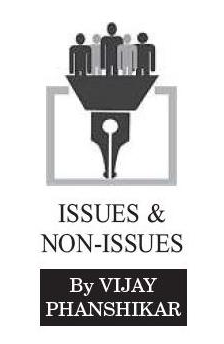Why Kangana Why This
| Date :13-Nov-2021 |

Freedom that came in 1947 was a “bheek” is fully uncalled for and absolutely off the mark -- and should never have been made not just by Kangana Ranaut but by anybody.
Actor Kangana Ranaut kicked off a firestorm on Thursday for declaring that India attained “real freedom” in 2014, when the Modi-led Government came to power, and describing the country’s Independence in 1947 as “bheek” or alms.
The ‘Manikarnika’ actor, known for provocative and often inflammatory statements, was once again the centre of debate -- and ire. ...
EVEN for those who are generally supportive of the celebrated and controversial actress Kangana Ranaut, her statement that what India got in 1947 by way of freedom was a “bheek” is rather difficult to digest. By no standard can such a statement be supported or appreciated as it seeks to militate against the sentiments of all Indians, irrespective of their leanings and ideological differences. Clearly, she went overboard.
And because this strange statement came soon after Kangana Ranaut was honoured with Padmashri Award at hands of President Mr. Ram Nath Kovind, it attracted people’s attention -- and also their sharp and sentimental criticism -- all the more. Clearly, she made a very major mistake possibly in over-enthusiasm. In the process, she has hurt the national sentiments beyond measure.
So uncalled for the statement is that its mitigation would be possible only when Kangana Ranaut tenders her profound apologies for making it.
No matter the details -- of transfer of power through a terrible Partition -- the point of time at the stroke of midnight hour on August 15, 1947, is considered by the entire Indian nation as a very valued moment in India’s history of long centuries of alien rule. Countless lakhs of people made supreme sacrifice to make that moment possible -- through multiple efforts, by adopting different approaches that even included armed struggle that culminated on that day.
The larger Indian society may have got tormented by the debate later on whether the Partition could have been avoided. But all that proved to be a matter of after-thought. Even those who worked all their life for Akhand Bharat also appreciated and welcomed the moment of liberation from the British yoke on August 15, 1947. In his seminal work Itihasachi Saha Soneri Paney (‘Six Golden Pages of History’), even Swatantryaveer Vinayak Damodar Savarkar describes that as the sixth golden chapter. He then builds a mental picture of a vibrant nation thereafter.
Various points of view, too, are available as to the components that led to freedom. Some believe that freedom was won through non-violent struggle led by the Congress party led by Mahatma Gandhi and some such similar organisations. Many others feel strongly that freedom became possible also because of the realm of impossibility that confronted the British due to armed revolutionary movement, the Indian National Army led by Netaji Subhas Chandra Bose, the earlier Ghadar movement, the 1857 War of Independence plus countless other conflicts the common Indian people heaped on the British in a relentless manner. Historical fact shows that India fought the British in countless ways that included confrontation in industry, sports, literature, culture and what have you ...!
But the common denominator of all this wide-spectrum of thought is that all the efforts cumulatively led to the moment of freedom on August 15, 1947. On that count, the nation has had no dispute whatsoever.
It may also be true that in the initial years, the fledgling Indian nation was led by people who were not experienced in governance. Those people also followed lots of wrong policies and practices and brought much trouble to the nation. No matter that, nobody has doubted the truth of freedom in 1947 -- that came through hard work, long struggle and extreme sacrifices of countless people, won deservingly by the people.
Unfortunately, Kangana Ranaut has her own opinion on the issue, which does not have any moral sanction because the freedom earned such a hard way cannot be a “bheek” to a nation. Many may have different views on the quality of what ultimately fell into the country’s lap. But none ever doubts that it was not freedom. The celebrated actress, who is a darling of millions of Indians, should never have got swayed by some unthought expression. She should have maintained a better sense of restraint.
When the country is celebrating Azadi Ka Amrut Mahotsav (Nectar Jubilee of Independence), such a comment should not have been made at all by anybody, let alone Kangana Ranaut -- who is known for her patriotism and high-octane commitment to excellence in her art-form. Through all her cinematic endeavours, she has created in people’s mind such a wonderful impression about herself as to be treated as a national icon. And then comes this statement. Unfortunate!
Of course, Kangana Ranaut is free to have her political opinion all right. She has all the freedom to think that the larger Indian scenario changed dramatically after 2014 after the ascendency of Mr. Narendra Modi as Prime Minister. She is also free to feel that Mr. Modi has brought in several right things which the nation had been waiting for all these years.
Despite that, the statement that the freedom that came in 1947 was a “bheek” is fully uncalled for and absolutely off the mark -- and should never have been made not just by Kangana Ranaut but by anybody.
There is one point that calls for attention here. It is as regards the slogans raised by a group of anti-nationals in a university -- ‘Bharat Tere Tukde Hoge Inshallah Inshallah’. If Kangana Ranaut is wrong in making her statement, then what about that dirty slogan?! If she is to be made to apologise, then how do we allow the raisers of that anti-national slogan even to contest elections under the banner of some political parties?
That also is a question.